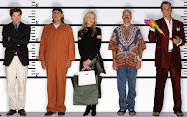
On Alan Sepinwall's blog, he offers episode commentary immediately after each Sunday's airing of Mad Men. He begins his Season 2, Episode 1 commentary with thoughts on the allegories and metaphors within the brilliant period piece (no real spoilers below, it's just well written). Once I finish Season 1 (and will be completely caught up), I'll post my own thoughts on this wonderfully fascinating show.
Among the many subjects of "Mad Men" is the great generational divide of the 1960s, as seen through the eyes of a company about to end up on the wrong side of it. But what I've always found fascinating is that the show's hero (of sorts) isn't presented as the lone voice trying to convince his colleagues that a change is gonna come, but one of the guys trying to hold back the tide. Sure, Don's more enlightened about women (to an extent; Peggy or Midge might agree with that notion, but Betty wouldn't if she were self-aware enough to understand it) and minorities. But he wants no part of this new cultural shift. During the presidential election last season, he (and the show) identified himself with Nixon, while the loathsome Pete -- who also happens to have a better handle on these new trends than any other character -- was held up as the Kennedy analogue.Read the rest here.
Even if Don hadn't just had a physical where the doctor, in Don's eyes, all but handed him a walker and told him to get ready for the retirement home, I imagine he would have resisted Duck Phillips' request to hire on some younger copywriters. Don has always resisted the flash of the new. His entire career is built on older values. Again and again, he's given chances with his ad campaigns to look forward, and again and again he chooses to look back. That's what "The Wheel" was about: rather than play up the technological aspect that the Kodak people wanted, Don went for an old-school -- and, I should say, brilliant -- tug for the heartstrings.
What I love about "Mad Men" is the double-edged nature of its take on the period. On the one hand, the series takes great delight in highlighting all the behavior of the time that would and should be unacceptable today -- as John Slattery put it at the TCA Awards, "the show's message of drinking and smoking and whoring." On the other, the nostalgia that Don talked about in "The Wheel" is very real. The series has a very classical storytelling style, eschewing quick cuts and busy plots in favor of a leisurely pace that wouldn't seem inappropriate in a film from 1962, and you can tell that Weiner is no fan of today's youth-driven culture, where every movie is targeted at 14-year-old boys, and where every piece of entertainment has to be as loud and obvious as possible. ...









.jpg)


No comments:
Post a Comment